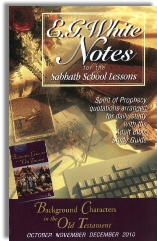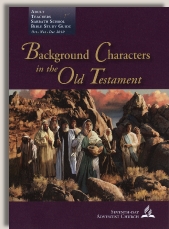|
||||||||||||||
Commentary on "Jonathan: Born for Greatness"
Day 2: Sunday, October 17, 2010 - The High Office of Friendship
Animal Instinct
Before we can even discuss the nature of friendship, we must address an idea presented in the Sabbath School Quarterly. On page 42 of the Teachers Quarterly, we find the following:
Most of us would expect a mother to be prepared to die in order to save her child’s life or a man to protect his family at whatever cost to himself. These strong relationships are admirable, normal, and a reflection of God’s love for us. But this is an instinct that we share with many animal species.
Animals do exhibit instinctual traits that often mimic admirable human traits. These traits in the animals are only instincts. We do have some instinctual traits that seem to be related to those exhibited by animals, but they are of an altogether different nature.
No animal has been created in the image of God. Even in his natural, fallen state, man has the ability to respond to the awareness of God as generally revealed in his creation, or specifically revealed in his word, the Bible. Romans chapter 1 addresses this issue. Although not a part of the Quarterly lesson, if you are having difficulty in this area, I suggest reading Romans 1 to begin to understand how human nature differs from that of the animals.
God has revealed to us that even in our natural, fallen state we have the ability to respond to his love. We can either respond in love toward God and our fellow man/woman by living according to the order in which God has created, or by living like animals, and rejecting the order God has given. Romans 1:21-25 explains how people did not honor God, nor give him thanks, but became futile, so much so, that God “gave them up.”
For although they knew God, they did not honor him as God or give thanks to him, but they became futile in their thinking, and their foolish hearts were darkened. Claiming to be wise, they became fools, and exchanged the glory of the immortal God for images resembling mortal man and birds and animals and creeping things. Therefore God gave them up in the lusts of their hearts to impurity, to the dishonoring of their bodies among themselves, because they exchanged the truth about God for a lie and worshiped and served the creature rather than the Creator, who is blessed forever! Amen.
This passage is not referring to Christians, individuals who are indwelt with the Holy Spirit and are daily living by his guidance. This passage is referring to humans in general. Even unbelievers have the witness of God given them, and have the opportunity to order their lives according to the nature given them by their Creator.
For the quarterly author to suggest that the love of a mother or father are equivalent to the instincts found in all animals is to make a Darwinian conclusion based on observational similarities, without an attempt to see the underlying spiritual realities that distinguish us from the animal kingdom. Darwinians/Evolutionists, atheists, and unbelievers of many kinds would almost laugh to discover such a statement in a purportedly Christian publication.
The statement is made at the bottom section of this page that “[f]riendship is much more than instinct.” For human beings, so is mothering, fathering, babysitting, care-taking (of elders or the infirm), and so many other human relational experiences in life. Let’s not confuse human beings with animals. The very word “being” in the designation for humans should suggest that we are of a different nature than the animal kingdom.
Friendship
In the last paragraph for today’s lesson, the author refers to 1 Samuel 20 without a suggestion to read this chapter. This is a crucial passage in the story about Jonathan and David, as well as the relationship of Saul to both of them. The quarterly author states that,
Friendship is much more than instinct. True friendship must be nurtured by communication. Friends are there to help in all the challenges of life, not just to share the “fun” times.
For a while I thought that I was reading a Quarterly written for children. No adult, who has ever had a true friend, would think that friends are “just to share the ‘fun’ times.” True friendship encompasses all aspects of a relationship minus those aspects that are shared in intimate marital relations. (There may be enough childish adults in this world that these statements need to be made.)
Perhaps the idea of the difference between a “friend” and a “true friend” may help. In our modern times, we use the word “friend” to refer to all sorts of people. One might say, “I have many friends” meaning, “I know lots of people, and lots of people know me.” Or likewise, “I am liked by a lot of people.” Liking and being liked does not describe depth of a relationship, but only surface contact. The old word, “acquaintance” is a perfectly good word that has fallen into disuse in proper contexts. So not to offend the many people one knows, one may be tempted to refer to them as “friends” rather than “acquaintances.” Let’s begin using words like acquaintance, associate, contact, colleague, etc. and stop misusing and overusing the word friend.
As 1 Samuel 20 indicates, a true friend will be one who would also risk his life for the friend, as Jonathan did, when his father, Saul, hurled a spear at him (v. 33.) When one of these ancient warriors threw a spear, we must not think in modern terms of someone throwing a pointed stick. It is the equivalent of someone today using a high-powered assault rifle with laser accuracy.
This discussion of friendship reminds me of an old saying,
A friend will come bail you out of jail. A true friend will be sitting in the cell next to you.
In an age when we can add hundreds of friends on our Facebook account, or even rent-a-friend, a service that has been used in many countries and is gaining in popularity here in the United States, we often forget the deep and long-lasting nature of a true friendship.
Most definitely, we can agree with the lesson author that friendship does not have an equivalent in the animal kingdom. But we must not suggest that any other human relationship shares the same instincts as animals. We may have animal-like instincts, but these shouldn’t be confused with animal instincts.
One final thought about the last question for today’s lesson. The author asks,
“What character traits do you need to change in you in order to be a better friend?”
Your “character traits” have been given to you by God. Do you want to change that? Again, the author is reverting back to a 19th century language and thought that does not express truth in the 21st century. We don’t change our characters; we change our behavior. We are born with characters; any parent can tell you that. It is not the character that is the problem.
If we have not been born again, it doesn’t matter what our character is, it is in wrong relationship to God. If we have been born again, it doesn’t matter what our character is, God will use it in ways that he cannot use people with different characters. It is our behavior as Christians that must be continually worked on.
As far as friendship goes, just be careful about the characters you hang around with! (Am I sounding like a parent?)
The lack of depth in most relationships, which is normal for acquaintances, contacts, colleagues, associates, etc., is not indicative that we need to deepen those relationships. We need to return to a correct usage of these terms so that we don’t expect friend-like experiences with those many relationships that do not fall into the sphere of friendship. Let’s be like a Jonathan to our friends, with the characters and traits that God has blessed us with. In doing that within the body of Christ, we then become to our Lord Jesus, like Jonathan was to David.
Summary
- We are not animals; we have spirits, they do not. And although we and animals may share similar traits, we must remember that there is similarity, not sameness. We were created in the image of God, the animals were not.
- Read Romans 1 if you are not sure about the difference between humans and animals.
- We were born with certain character traits; any parent can tell you that. We don’t change our characters; we change our behaviors.
- The lack of depth in most relationships, which is normal for acquaintances, contacts, colleagues, associates, etc., is not indicative that we need to deepen those relationships. We need to return to a correct usage of these terms so that we don’t expect friend-like experiences with those many relationships that do not fall into the sphere of friendship.
- Continue reading 1st Samuel for about 30 minutes a day. You’ll be done by Friday!
Copyright 2010 BibleStudiesForAdventists.com. All rights reserved. Revised October 14, 2010. This website is published by Life Assurance Ministries, Glendale, Arizona, USA, the publisher of Proclamation! Magazine. Contact email: BibleStudiesForAdventists@gmail.com.
The Sabbath School Bible Study Guide and the corresponding E.G. White Notes are published by Pacific Press Publishing Association, which is owned and operated by the Seventh-day Adventist church. The current quarter's editions are pictured above.
Official Adventist Resources
Standard Edition Study Guide Week 4
Teacher's Edition Study Guide Week 4
Easy Reading Edition Study Guide Wk 4
Search the Complete Published Ellen G. White Writings


